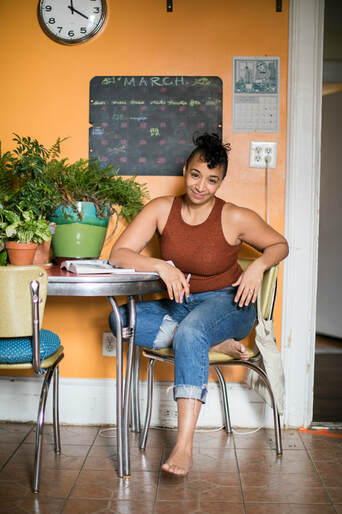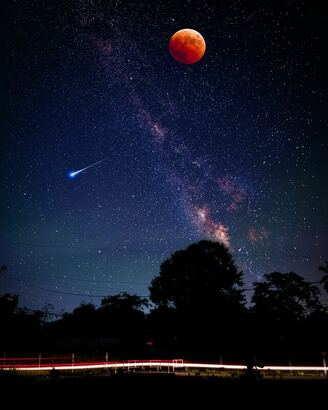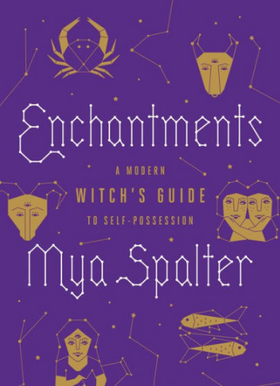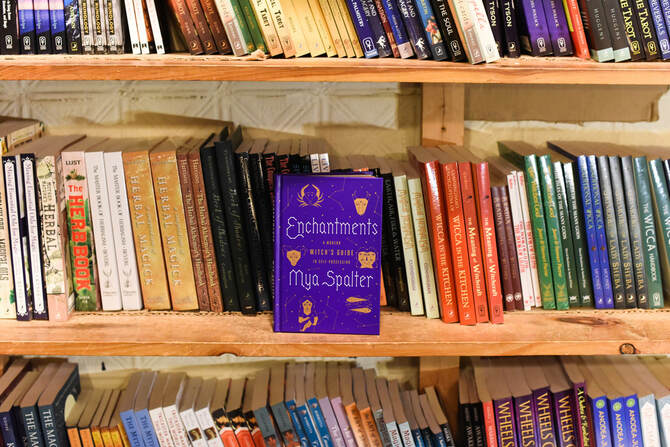Conversations with Mya Spalter, Author of “Enchantments: A Modern Witch's Guide to Self-Possession”5/4/2019 By Amber C. Snider Author Mya Spalter discusses her widely acclaimed book Enchantments, her creative process, and how to access your own spiritual power.  Photo @ Mel Barlow Photo @ Mel Barlow On a cool night in April, Mya and I meet at a cozy back table at Mud, a bohemian-inspired coffee shop in the East Village, to discuss her premiere book Enchantments: A Modern Witch's Guide to Self-Possession, which debuted in October 2018 from Random House. She arrives, tranquil and suave in a red hoodie and hat, giving off a warm vibe and saddles up in the seat across from me. Spalter has the power to make you take notice of your own tense energies, reassess, and then chill the fck out. I’ve heard a lot about her book over the last several months. A long-time employee of the namesake store Enchantments, Spatler used her magickal path to help guide others in their spiritual journey by offering a down-to-earth, conversational guide to witchcraft. Here, she talks about why she wrote the book, chaos magic, uses of archetypes and astrology, the rise of witchcraft, and everything in between. Amber C. Snider (ACS): When did you first decide to write the book Enchantments? Mya Spalter (MS): I started working at [the store] Enchantments again for the second time just after Samhain in 2017, and I was ready to write the book proposal by February. It was clear that people had a lot of questions. They were really interested in learning more about witchcraft in general. Customers came in with a lot of enthusiasm and asked the same questions over and over again, so I knew what the public wanted and what I could offer with the book. ACS: What makes your book different from others currently on the market? MS: There are a ton of books available that have similar information, it’s just that I was never particularly attracted to the voice of those books. I didn’t feel like I related to it. So I figured there was room to write about these topics in a chatty, conversational tone that can make you laugh and give you a chance to breeze on to the next topic. ACS: And working at the store helped with that? MS: I feel like one thing Enchantments is better at than a lot of other places is managing to break down really large, esoteric topics into conversation – usually conversation full of puns, conversation that gets raunchy. ACS: When you were putting together the book, you took a trip out to New Mexico on the Amtrak to write. When you returned to NYC, you primarily worked through the night? MS: I did that for weeks and it was really heavy, but also so productive. Amazingly productive. It’s a whole other state, and a lot of work got done that way. It works best for me because I don’t tune people out. I pride myself on tuning people in. So I need to know that everyone who wants to talk to me is asleep or doing something else before I feel like I can relax and know that I’m going to stay uninterrupted. I get really stingy with my mind – if I feel like I only have 15 minutes, I’m not going to engage in any long-form thought. I really have to know that nobody is going to come and… ACS: ...interrupt? MS: Yes! Not that they would intentionally, but just the existence of other people—the cliches about writers where they’re throwing shoes at you because you walked into the room (laughs)— like I don’t want to do that, but I started to get that. ACS: Do you think motherhood also played a role in that as well? MS: Yeah, absolutely. For a long time, I didn’t see how I was going to manage to write anything as a mother. It was right at the time when [my son] wasn’t in school yet and I didn’t have enough distance to say, ‘Oh okay, now I can focus long enough to start writing things.’ But then they go to school right when you think your head is going to explode! So I had the urgency because I was a writer for many years before I was a mom, and didn’t manage to write a book. I think the fact that I was squeezed in those ways made me actually do what I needed to do.  ACS: Let’s talk a little bit about your background. You were an editor at Random House before? MS: I worked as an assistant editor for about five years and I wasn’t practicing a lot of magic then, but I don’t tend to do a lot of spells [in general]. But while I was [at Enchantments] I learned a little more about chaos magic, making sigils, and making pop magic, although that’s very similar to chaos magic. ACS: What is chaos magic? MS: Well, it’s the idea that there is the god Mercury, who represents swiftness of thought and genius and spark and communication, but you also have Flash from the comic books who embodies all those same qualities but in a way that is pop, in a way that is palpable, in a vernacular of our language and our time, rather than thinking of divinity as something that’s in some past time. Or placing it in some exotic culture that’s maintained its link to the divine. ACS: How does one practice chaos or pop magic? MS: It’s more about recognizing how we do [magic] in our own idiom. Just as easily as I could build an altar to Mercury, a pop magician would build an altar to the Flash or to Freddie Mercury or to Prince or someone else who embodies those qualities. It also has a lot to do with sigil magic, where you can kind of reduce your intention to a magical symbol and charge that symbol – the same way Enchantments charges a candle or herbs – it’s something you design yourself. It’s just lower tech, more portable, you just ritualize it differently. And it’s cool because you don’t need supplies. My bent is you never don’t have what you need. So if I didn’t have something, I’d find it. ACS: Something that I’m really interested in is why there has been a resurgence in magic in recent years. Why do you think witchcraft is gaining popularity all of a sudden? MS: I do feel there’s a renewed interest. I feel like it’s because people are looking for a sense of personal power…[that] isn’t contingent on having a government that represents you or feeling safe the way you’re policed where you live… ACS: So it’s about taking back control? MS: Yes, and it’s also about developing your own access to a spiritual power. All of us are usually taught that you need someone else to be your link to spiritual power, like you need some institution or you need someone to teach you how. I think there aren’t or shouldn’t be gatekeepers — nobody can tell you if you’re a witch or not. And if they try to then that’s great because you just learned something about them. ACS: What does it mean to be a witch? MS: It’s about trusting yourself to create your own spiritual experience. It’s about making your own idea of what that looks like. And so if that means a person who designs their own spiritual life, then I’m excited for a new resurgence of people who want to identify that way. People are lacking – I don’t think anyone would deny that people feel in a vacuum, so it’s a way to fill it without having to conform to anything. ACS: Did you always know that you were a witch? If there are no gatekeepers, there’s no prescription per se. MS: I would say so. Pretty much. I don’t think it makes me super unique but I don’t have any other experience except for mine. Like, isn’t it just how you feel when you’re a kid and full of possibility? [When I was a kid], I definitely played alchemy. I wanted to play in and with plants and flowers. I was definitely into ceremony and ritual, where I had it. I had a mixed religious upbringing – not dogmatic, but spiritual. So candles, stones, all of those things were always attractive to me. I always wanted to communicate with animals and be in nature. I had a whimsical quality. I was always a poet. ACS: Do you think poetry or the creative arts and witchcraft go hand in hand? MS: Definitely. ACS: How so? MS: Poetry is about finding the connections between things, or making metaphor or similes about finding the connections between things that are not thought to be connected. It’s about finding symmetries and balance in places. It’s also shuttling between microcosm and macrocosm, and pondering imponderable things...that is what poets do. Also, when people talk about a spell or an incantation, those are poems and lyrics.  ACS: What does magic mean to you? MS: For me, it means listening to what I already know. The only times I feel like I’m struggling or straying from that is going against what I already know. Like, who actually writes the book? Finds that apartment? Gets that life the way they wanted? It’s believing that ‘Oh, I’m the one who actually does that. It’s me.’ ACS: Would you say you could swap out the word ‘magic’ for ‘intuitive’? Deep, intuitive understanding? MS: Intuition sure. It’s one way to describe it, but I think it can also lead people astray. ACS: Because it comes down to the individual’s spiritual path? MS: A Christian person would probably say, ‘Oh that’s just God and Jesus keeping me on the path that he intends for me,’ so somebody having the same experience through that lens will describe it that way. And I describe it with ‘fucks’ and ‘maybes’ and ‘likes’ involved. Everyone’s got their own way of describing it. ACS: And that’s why you wrote this book? MS: I knew there were people out there who need to hear magic described in ‘fucks’ and ‘likes’ and ‘maybes’ and ‘I don’t knows’. Some people need to hear things that way – I know I do. If I found this book when I was a teenager I would freak out and be so excited about it! ACS: Do you identify with any particular tradition? Wiccan or Neopagan or…? MS: I like ‘witch’ because it’s vague. A lot of people don’t have a preconceived notion of what all that entails. Culturally I identify as Jewish, not philosophically necessarily, although that has a lot to do with the way I think about the world... ACS: You mean Judaism is part of your foundational understanding of the world? MS: Yes, not that I was indoctrinated into it, but the culture in my household and the rituals I learned about death, marriage, and coming of age were Jewish. ACS: Did you have a section of the book that you particularly enjoyed writing or something that you felt would really help others? Or a moment where you thought, ‘this is it’? MS: Some of the lines that I love the most that I feel would have the most impact are hidden. It’s not like ‘this is the deep section’, but you’re going along and it’s being kind of silly and it’s like ‘THAT’S THE TRUTH! What?!’ So it’s peppered throughout and there are moments where I [re-read it] and thought, ‘Did I say that?’ Because when do I make that much sense? So it’s great when I get caught up like that. ACS: Can you give me an example? MS: I read a part about uncrossing the other day. I needed some advice and I had a conversation with a friend who said how reassuring the book was. So I just kinda opened up the book and read, ‘Don’t worry, you can’t fuck this up, like everything’s great.’ And I was like, ‘Really?! That’s so nice to hear, because I’m a little messy now! Whatever I was writing then I was super confident, but like right now I have no idea what’s going on!’ So I was looking in the book like, “Well, maybe past Mya had something to say that will make sense…” And it kind of did. ACS: So you turned to your former self for advice? MS: Yeah! It’s weird and I don’t want to sound crazy, but sometimes I’ll pick up the book and start reading it and go through like 30 pages, even though I know what’s in here! ACS: What advice would you give to the magically curious? Someone who is just starting out and may have no idea where to turn? They may live in a small town somewhere, dealing with prejudice or come from a dogmatic background...what advice would you give them? MS: [In the book] I started with color association. I felt it’s super non-denominational. It doesn’t trigger a lot of hot points. ACS: Yes, every culture has their own associations with color… MS: Yes, and they change too. It just kind of felt like a way to say, ‘this is how sensory experience affects illusory experience.’ Go from there and then think about planetary energies – just because there’s so much about astrology that links to deity without talking about deity. ACS: And the planets are linked to gods and goddesses… MS: The planets and the gods and goddesses associated with the planets are the same in terms of qualities. But you can talk about the planets without talking about deity if that’s triggering for you. Thinking about planetary energies is a nice way to find access and separate your personas in different bits and pieces. So start with systems and pantheons, and study them. ACS: What about archetypes? I think ‘archetype’ can be a really helpful well of organizing the different parts of yourself, and also figuring out how you relate to the different people in your life. That makes the stuff very real. That’s why astrology makes so much sense, because it’s about me and my feelings. And so that’s where I feel the most need for magic, and also where people find it and use it. ACS: Did you invoke any deities during that creative time or perform any particular rituals that you found helpful? MS: Lots of rituals. I like to sing and dance. I sing and dance to myself a lot. I take very long and elaborate baths. There are deities I talk to a lot, but with the book I work with planetary stuff, so I did a lot of the stuff for the book during Mercury Retrograde, and just dug so deep. [Also], Venus and Sun when it was time to start putting the book together as an object: finding the cover, making it beautiful, getting publicity. I think it came together really beautifully. It was a clear way for me to see that this is about thought process. The creativity, words, chatter, flow and communicating what I want to communicate. Then it was about making it beautiful and appealing. Having this be an item that has friends now. [The book] is a being and it’s going on making friends without me. ACS: And any post-production efforts or rituals? MS: A big party. Enchantments: A Modern Witch's Guide to Self-Possession is now available at the brick-and-mortar Enchantments store and anywhere books are sold. Interview by Amber C. Snider
4 Comments
Sara
5/6/2019 06:59:13 pm
I absolutely love this book and Mya is accurate when she mentioned the voice of other books. So many I have read made me feel like I was being talked at or talked down to...some even made me feel like I wasn't really a witch because I wasn't initiated into a coven. This was the first book on witchcraft I truly was (am) excited about! I would love to thank Mya for writing this book and I hope her creativeness keeps flowing because I would love to read more!! <3
Reply
5/8/2019 08:32:31 am
Thanks for reading and commenting, Sara. And we agree with you – the world definitely needed Mya's book!
Reply
Jane
9/29/2023 06:10:26 pm
@jandu_thegifted_doctor on Instagram, her spell works are very effective
Reply
Leave a Reply. |
Archives
April 2024
MastheadPublisher Categories |

 RSS Feed
RSS Feed